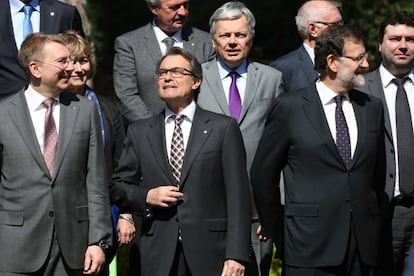Mas and Rajoy open EU- Mediterranean summit in Barcelona
Catalan premier and Spanish PM coincide at meeting to discuss immigration and terrorism

Illegal immigration and jihadism featured prominently on the agenda of an informal summit of European and southern Mediterranean foreign officials in Barcelona on Monday.
But the meeting was also notable for serving up an encounter between Spanish Prime Minister Mariano Rajoy and Catalan regional premier Artur Mas, who is seeking independence for the northeastern region.
Delivering his speech in four languages (Spanish, English, Catalan and French), Mas used his opening address at the Pedralbes palace to highlight “the umbilical cord” that has historically linked Catalonia with Europe and the Mediterranean. The CiU nationalist bloc leader also underscored Catalans’ ability to take their past into account while looking forward to the future.
We need to give our young people opportunities so they will not become easy prey to those ideologies”
Jordanian foreign minister Nasser Judeh
For his part, Rajoy praised Barcelona as “the Spanish capital of the Mediterranean,” one of several allusions he made to the Spanishness of the city in his address. He invited the attendees – who included representatives from 22 EU nations, along with those from Morocco, Algeria, Tunisia, Egypt, Palestine, Israel, Jordan and Lebanon – “to look together for solutions to the problems that we share.”
The Spanish leader went on to describe terrorism as the “main” global threat, adding that the Muslim world was as much a victim of radical Islam as others, and reminding attendees that Catalan authorities had last week broken up a jihadist cell that was planning to kidnap people and slit their throats on Spanish soil.
Rajoy also urged for further cooperation to avoid “the heartrending drama” of illegal immigration, calling for more development aid, increased investment, better channels for legal migration, and political dialogue.
An increased sense of urgency over both issues has pushed the EU to bring its southern neighbors back to the table after a hiatus of seven years to discuss European Neighborhood Policy (EPN).
Federica Mogherini, High Representative of the Union for Foreign Affairs and Security Policy and Vice-President of the European Commission, stressed the need to “work together” with southern Mediterranean countries and to “make political decisions” rather than get bogged down by bureaucratic procedures.
Spanish Foreign Minister José Manuel García Margallo echoed this view with a call for “more politics and less office time.”
The foreign ministers of Jordan and Egypt, Nasser Judeh and Sameh Shoukry, underscored the importance of addressing Islamist terrorism as a global threat and to combat it as such.
“We need to give our young people opportunities so they will not become easy prey to those ideologies,” said Judeh.
Margallo suggested taking up an old idea from 1937 that called for the creation of an international criminal court to try cases of terrorism.
Tu suscripción se está usando en otro dispositivo
¿Quieres añadir otro usuario a tu suscripción?
Si continúas leyendo en este dispositivo, no se podrá leer en el otro.
FlechaTu suscripción se está usando en otro dispositivo y solo puedes acceder a EL PAÍS desde un dispositivo a la vez.
Si quieres compartir tu cuenta, cambia tu suscripción a la modalidad Premium, así podrás añadir otro usuario. Cada uno accederá con su propia cuenta de email, lo que os permitirá personalizar vuestra experiencia en EL PAÍS.
¿Tienes una suscripción de empresa? Accede aquí para contratar más cuentas.
En el caso de no saber quién está usando tu cuenta, te recomendamos cambiar tu contraseña aquí.
Si decides continuar compartiendo tu cuenta, este mensaje se mostrará en tu dispositivo y en el de la otra persona que está usando tu cuenta de forma indefinida, afectando a tu experiencia de lectura. Puedes consultar aquí los términos y condiciones de la suscripción digital.








































